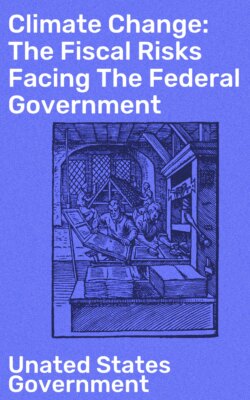Читать книгу Climate Change: The Fiscal Risks Facing The Federal Government - Unated States Government - Страница 5
На сайте Литреса книга снята с продажи.
The Current Picture of Fiscal Risk
ОглавлениеTable of Contents
Climate change is already affecting communities across the United States. The most recent National Climate Assessment (NCA) clearly established the sweeping effects of climate change, many of which are already evident in the lives of Americans. Fifteen of the sixteen warmest years on record globally have occurred between 2000 and 2015, and 2015 was the warmest year on record (NOAA, 2016a). The trend is continuing in 2016, with each of the first eight months in 2016 setting a record as the warmest respective month globally in the modern temperature record, dating to 1880. August 2016 marked the 16th consecutive month that the monthly global temperature record was broken (NOAA, 2016b), while September 2016 was surpassed only by record-breaking September 2015 (NOAA, 2016c). In addition, heat waves, wildfires and some extreme weather events such as heavy rainfall, floods, and droughts have become more frequent and/or intense in recent years. While scientists continue to refine projections, it is clear that climate change will continue and its damaging impacts will intensify without considerable action to reduce GHG emissions and to respond with adaptive measures. Even with significant near-term emissions reductions, dealing with near- and mid-term impacts due to past and current emissions will still pose challenges.
The impacts of climate change will also affect the Federal balance sheet. For example, an increase in the frequency of catastrophic storms will require more disaster relief spending and flood insurance payouts. Rising seas and heavy rainfall events will prompt investments to protect, repair, and relocate Federal facilities. Changing weather patterns and extreme weather events will affect American farmers and the Federal programs that support their risk management. Climate impacts affecting the nation’s food, water, air quality, weather, and built and natural environments endanger the health of the American people and weigh on Federal health care programs. An increase in wildland fire frequency and intensity will place further strain on Federal fire suppression resources. Climate change shocks and stressors worldwide pose global security risks and affect resource needs for defense operations and infrastructure. Wide-ranging impacts will impede economic production and diminish Federal revenue.
Although the presence of risk across these and other exposure points is clear, we remain in the early stages of quantifying the total likely burden for American taxpayers. In several critical areas, quantitative projections of specific climate impacts are not yet available. The projections we do have are useful in approximating the order of magnitude of potential impacts of climate change on the Federal Budget, but are still subject to significant limitations and uncertainty. As a result, because of these limitations and because other impacts are not considered in this assessment, the total costs of climate change for the Federal Government may be greatly underestimated, and other costs affecting the American people are not considered here. Despite these limitations, the accumulated evidence suggests the fiscal impacts of further unmitigated climate change could leave a significant imprint on the Federal Budget over the course of this century.
